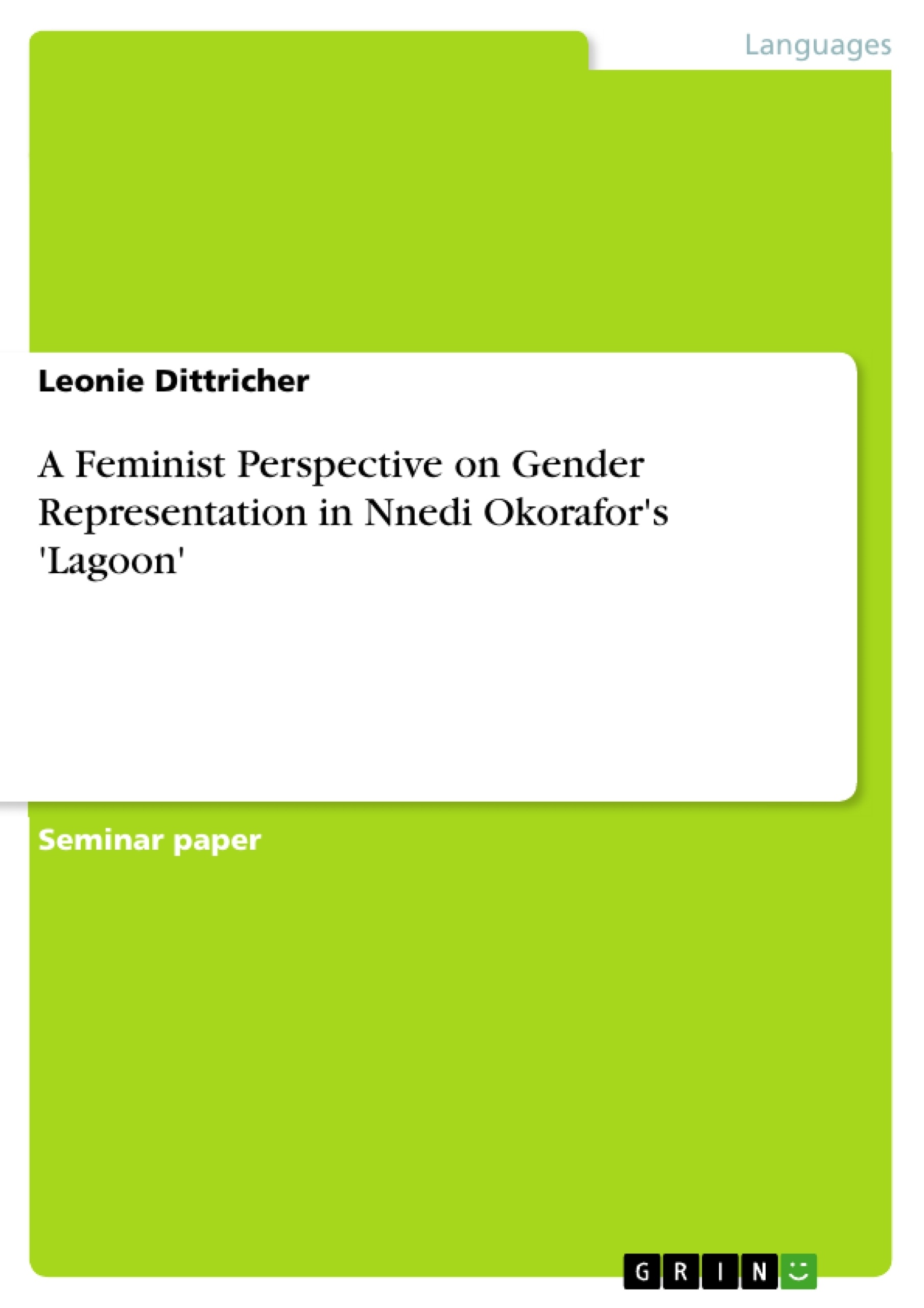Nnedi Okorafor’s novel 'Lagoon' is a work of speculative fiction which challenges science fiction stereotypes by placing an alien invasion narrative inside Lagos, Nigeria and mixing mythological creatures and aliens with themes of spirituality, ideology, and political, social and personal dilemmas. Among those, the novel explores terrains of gender inequality and gender identity and displays a feminist attitude towards those issues.
The characters and their actions underline the conflicts which define issues researched in gender studies. That and the themes as well as reader and author-related motives are guidelines to outline the representation of gender in Nnedi Okorafor’s 'Lagoon' and attempting to expose a feminist mentality.
Nnedi Okorafor challenges traditional gender roles explicitly and implicitly by offering a wide range of personalities and by placing those personalities in a chaotic and dangerous environment, which places both male and female characters on the same level of imminent danger, with outsiders offering a new perspective on traditional human conceptions. She explores many different aspects of feminist literary theory and offers new ways of perceiving and understanding gender in general, therefore challenging its traditional representation in speculative fiction. So is 'Lagoon' a feminist novel?
Gender representation is a type of research done under the pretext of the philosophical discourse of feminist theory, which, among other practices, investigates the gender roles that define a societal norm. The topics which are subject to investigation when trying to establish gender roles deal with issues under the precept of different feminist disciplines, such as the psychological background of the ‘mind / body dichotomy’ which is described in Susan Bordo’s book 'Unbearable Weight'. It asserts that throughout time the typical gender role of the woman has established itself to be represented by the body, while, for men, it is represented by the mind. This, of course, leads to several issues for women, which are also relevant topics in 'Lagoon'. For example, oppression and sexual objectification are still mentioned frequently as problematic topics calling for feminist action. Okorafor presents several characters in her novel who struggle with those issues.
Inhaltsverzeichnis (Table of Contents)
- Introduction
- Nnedi Okorafor and Lagoon
- Background on Gender Representation
- In Nigerian Literature
- In Speculative Fiction
- Gender Representation in Lagoon
- The characters
- Conclusion: Is Lagoon a feminist novel?
Zielsetzung und Themenschwerpunkte (Objectives and Key Themes)
This preview aims to explore the representation of gender in Nnedi Okorafor's novel Lagoon through a feminist lens. By analyzing the characters, their actions, and the broader thematic landscape, the preview seeks to understand how the novel reflects and challenges traditional gender roles within the context of speculative fiction and Nigerian culture.
- Feminist perspectives on gender representation
- Exploration of gender roles and identity in Nigerian literature and speculative fiction
- Analysis of character portrayal and their engagement with feminist issues
- The impact of cultural and social contexts on gender representation
- Examining the potential for Lagoon to be considered a feminist novel
Zusammenfassung der Kapitel (Chapter Summaries)
The introduction provides a context for the analysis, defining key terms related to gender representation and feminist theory, and outlining the novel's setting and themes. It highlights the importance of understanding the cultural and social context of the novel, along with its exploration of traditional gender roles and the "mind-body dichotomy" as it relates to feminist discourse.
The chapter on Nnedi Okorafor and Lagoon examines the author's background and her creative process. The preview analyzes Okorafor's thematic focus on strong female characters and her exploration of the challenges and complexities faced by women in African culture.
The chapter on "Background on Gender Representation" delves into the broader context of gender representation in both Nigerian literature and speculative fiction. It explores the existing conventions and challenges in these genres, providing a foundation for understanding Okorafor's unique contributions.
Schlüsselwörter (Keywords)
The central keywords for this analysis include gender representation, feminist theory, Nigerian literature, speculative fiction, cultural context, gender roles, character analysis, and the "mind-body dichotomy". These terms encapsulate the key areas of focus and theoretical frameworks used to understand the representation of gender in Lagoon.
Frequently Asked Questions about 'Lagoon' by Nnedi Okorafor
Is 'Lagoon' considered a feminist novel?
Yes, 'Lagoon' is often analyzed as a feminist novel because it challenges science fiction stereotypes, explores gender inequality, and presents strong female characters in leadership roles.
How does Nnedi Okorafor challenge traditional gender roles?
She places both male and female characters in the same level of imminent danger and offers a wide range of personalities that defy the "mind/body dichotomy" often found in literature.
What is the "mind/body dichotomy" in this context?
Based on Susan Bordo's theories, it's the tradition of associating men with the "mind" (reason) and women with the "body" (emotion/objectification). Okorafor dismantles this through her character development.
What is the setting of 'Lagoon'?
The story is set in Lagos, Nigeria, blending an alien invasion narrative with local mythology, spirituality, and contemporary political dilemmas.
How does speculative fiction address gender identity?
Speculative fiction allows authors to create worlds where social norms can be reimagined, providing a platform to critique real-world oppression and explore fluid gender identities.
- Quote paper
- Leonie Dittricher (Author), 2015, A Feminist Perspective on Gender Representation in Nnedi Okorafor's 'Lagoon', Munich, GRIN Verlag, https://www.hausarbeiten.de/document/352670


